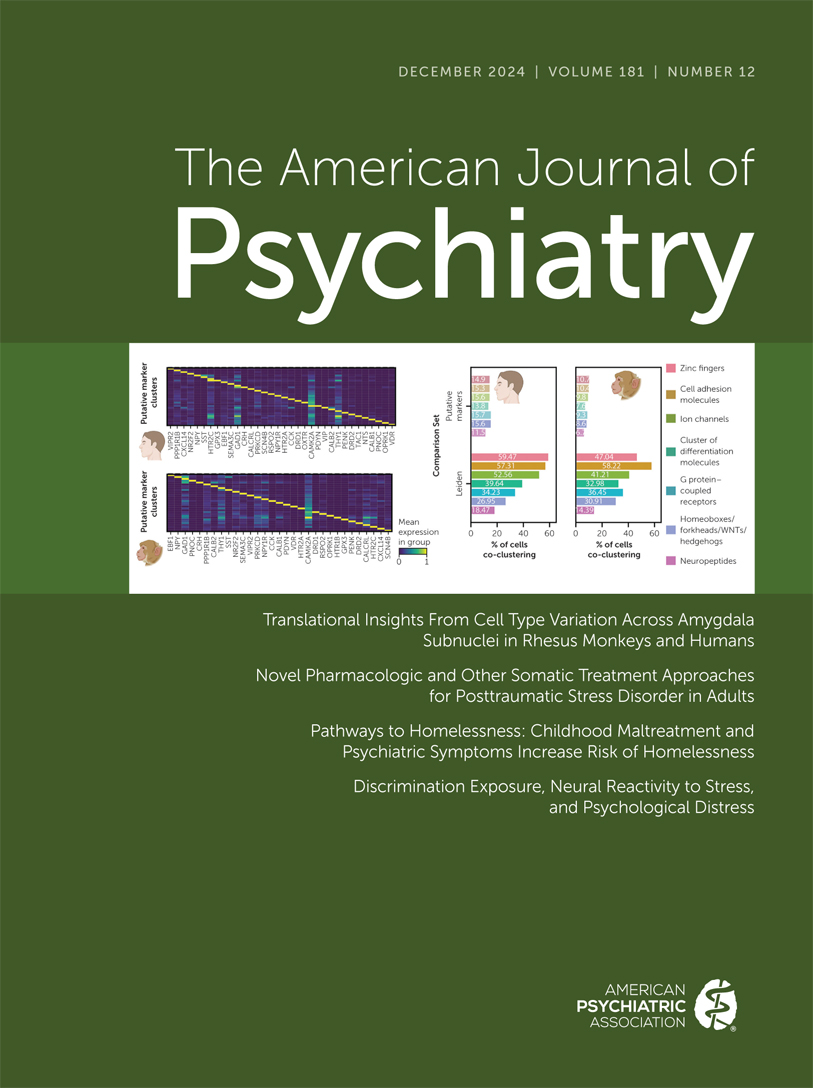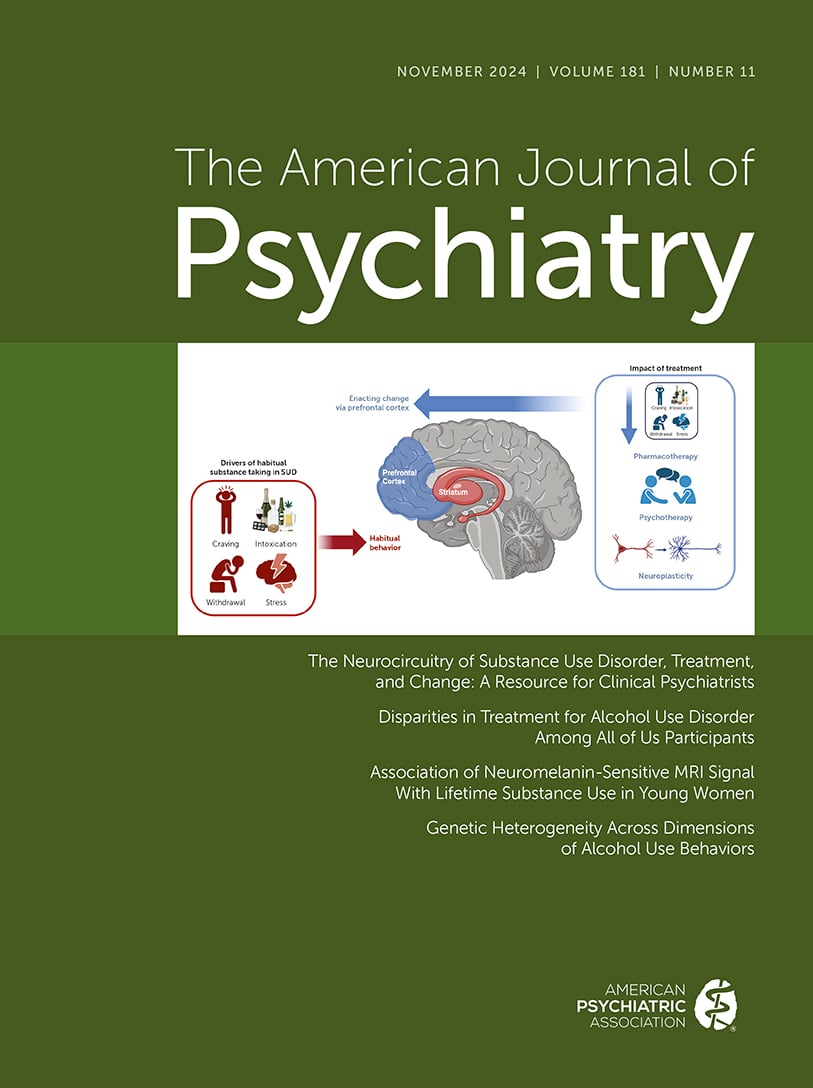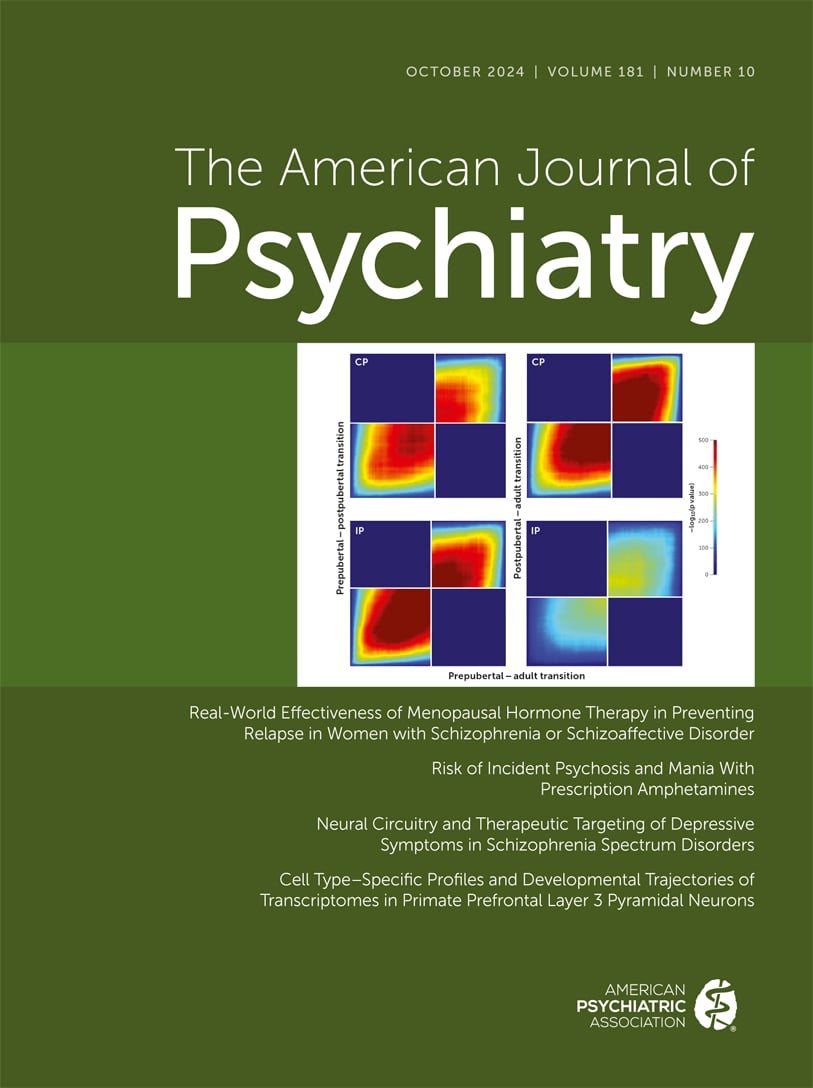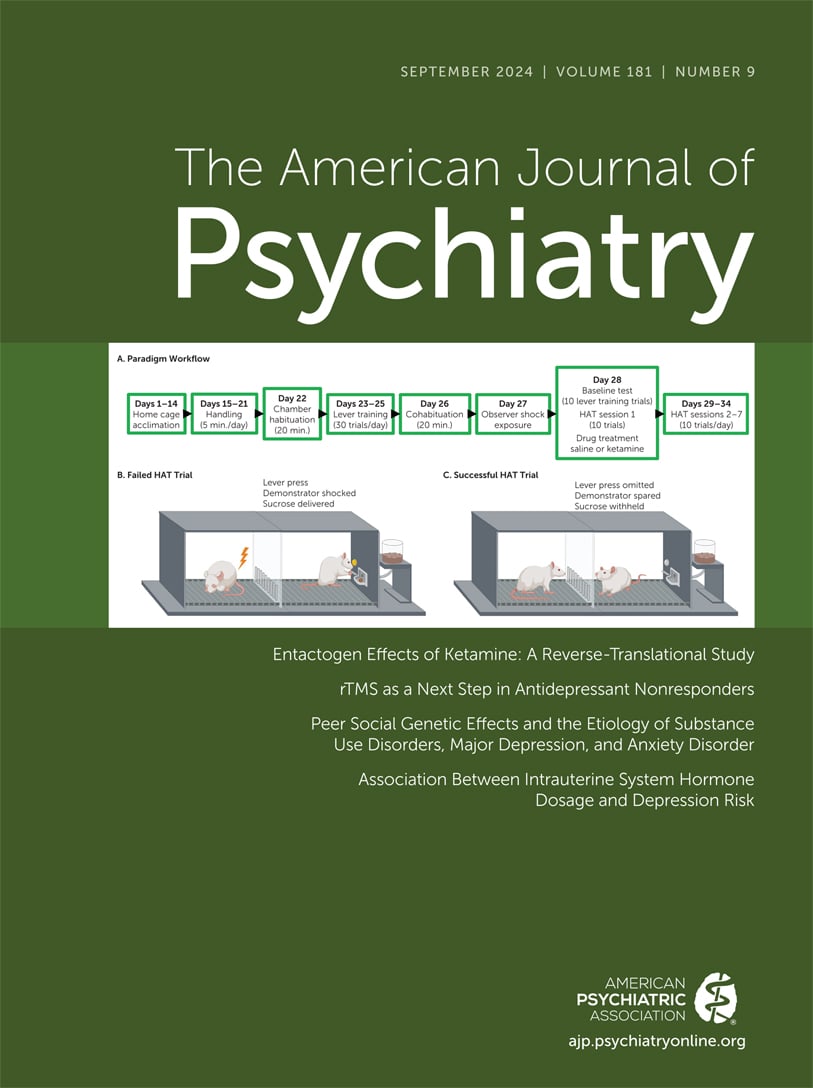American Journal of Psychiatry
- Volume 163
- Number 1
- January 2006
In This Issue
Editorials
Editors Note
Images in Neuroscience
Introspections
Clinical Case Conference
Treatment in Psychiatry
Images in Psychiatry
Article
Publication date: 01 January 2006
Pages28–40OBJECTIVE: Selective serotonin reuptake inhibitors (SSRIs) are widely used to treat depression, but the rates, timing, and baseline predictors of remission in “real world” patients are not established. The authors’ primary objectives in this study were to ...
https://doi.org/10.1176/appi.ajp.163.1.28Publication date: 01 January 2006
Pages41–47OBJECTIVE: In March 2004 the U.S. Food and Drug Administration (FDA) warned physicians and patients regarding increased risk of suicide with 10 newer antidepressant drugs. Available data leave considerable uncertainty regarding actual risk of suicide ...
https://doi.org/10.1176/appi.ajp.163.1.41Publication date: 01 January 2006
Pages48–51OBJECTIVE: The authors examined effects of a triallelic functional polymorphism of the human serotonin-transporter-linked promoter region (5-HTTLPR) on in vivo expression of serotonin transporter in the brain in healthy volunteers and subjects with major ...
https://doi.org/10.1176/appi.ajp.163.1.48Publication date: 01 January 2006
Pages52–58OBJECTIVE: CSF analysis, neuroendocrine challenges, serotonin depletion studies, and treatment studies implicate the serotonergic system in the pathophysiology of major depressive disorder. On the basis of postmortem and imaging studies, the authors ...
https://doi.org/10.1176/appi.ajp.163.1.52Publication date: 01 January 2006
Pages59–66OBJECTIVE: Subsyndromal major depressive disorder is common among HIV-positive adults. This study was designed to assess the efficacy of dehydroepiandrosterone (DHEA) as a potential treatment. METHOD: One hundred forty-five patients with subsyndromal ...
https://doi.org/10.1176/appi.ajp.163.1.59Publication date: 01 January 2006
Pages67–72OBJECTIVE: The authors studied recurrent problems in psychotherapy with suicidal patients by examining the cases of patients who died by suicide while receiving open-ended psychotherapy and medication. METHOD: Therapists for 36 patients who died by ...
https://doi.org/10.1176/appi.ajp.163.1.67Publication date: 01 January 2006
Pages73–78OBJECTIVE: This study examined the utility of baseline psychomotor speed, measured with neuropsychological tests, to predict fluoxetine response in moderately depressed outpatients. The authors hypothesized that since psychomotor slowing in depressed ...
https://doi.org/10.1176/appi.ajp.163.1.73Publication date: 01 January 2006
Pages79–87OBJECTIVE: Erectile dysfunction and depression are highly associated. Previous studies have shown benefits of phosphodiesterase-5 inhibitor treatment for erectile dysfunction associated with antidepressant therapy or subsyndromal depression. The present ...
https://doi.org/10.1176/appi.ajp.163.1.79Publication date: 01 January 2006
Pages88–94OBJECTIVE: High-frequency left-side repetitive transcranial magnetic stimulation (rTMS) and low-frequency stimulation to the right prefrontal cortex have both been shown to have antidepressant effects, but doubts remain about the magnitude of previously ...
https://doi.org/10.1176/appi.ajp.163.1.88Publication date: 01 January 2006
Pages95–100OBJECTIVE: The goals of this study were to determine the course of illness in a cohort of depressed patients undergoing treatment for 6 months and whether there are clinically useful predictors of their course of illness. METHOD: A cohort of 175 depressed ...
https://doi.org/10.1176/appi.ajp.163.1.95Publication date: 01 January 2006
Pages101–108OBJECTIVE: Continuation of antidepressant treatment for depression beyond the first months helps to consolidate treatment response and to reduce the risk of early relapse. The authors sought to characterize the rate and pattern of antidepressant ...
https://doi.org/10.1176/appi.ajp.163.1.101Publication date: 01 January 2006
Pages109–114OBJECTIVE: Substantial evidence supports the heritability of lifetime major depression. Less clear is whether genetic influences in major depression are more important in women than in men and whether genetic risk factors are the same in the two sexes. It ...
https://doi.org/10.1176/appi.ajp.163.1.109Publication date: 01 January 2006
Pages115–124OBJECTIVE: The multiple risk factors for major depression are interrelated through poorly understood developmental pathways. In 2002, the authors presented a developmental model for major depression in women. Based on similar methods, they here present an ...
https://doi.org/10.1176/appi.ajp.163.1.115Publication date: 01 January 2006
Pages125–132OBJECTIVE: The authors investigated whether quality improvement programs for depression would be effective among substance misusers and whether there would be a differential program-by-comorbidity effect. METHOD: A group-level randomized controlled trial (...
https://doi.org/10.1176/appi.ajp.163.1.125Publication date: 01 January 2006
Pages133–137OBJECTIVE: The role of ovarian steroids in both premenstrual dysphoria and perimenopausal depression has led to the suggestion that these conditions represent expressions of the same underlying disorder. Premenstrual mood symptoms were evaluated in women ...
https://doi.org/10.1176/appi.ajp.163.1.133Publication date: 01 January 2006
Pages138–144OBJECTIVE: The reporting of depressive symptoms following myocardial infarction may be confounded by complaints originating from the myocardial infarction. Therefore, it is difficult to estimate the effects of post-myocardial infarction depression and its ...
https://doi.org/10.1176/appi.ajp.163.1.138Publication date: 01 January 2006
Pages145–147OBJECTIVE: The authors’ goal was to determine the concentration of antidepressants in amniotic fluid during maternal treatment of depression. METHOD: Women treated with antidepressants undergoing amniocentesis for obstetrical reasons were enrolled. ...
https://doi.org/10.1176/appi.ajp.163.1.145Publication date: 01 January 2006
Pages148–150OBJECTIVE: Although experts in the treatment of depression have suggested that achieving remission is the primary goal of treatment, questions remain about how remission should be defined. In antidepressant efficacy trials, remission is defined according ...
https://doi.org/10.1176/appi.ajp.163.1.148Brief Report
Publication date: 01 January 2006
Pages151–153Few data on stress symptoms related to the World Trade Center disaster in law enforcement personnel have been reported. Most New York City Police Department (NYPD) officers had significant exposure to the events of Sept. 11, 2001. Approximately 5,000 ...
https://doi.org/10.1176/appi.ajp.163.1.151Publication date: 01 January 2006
Pages153–155OBJECTIVE: This study was designed to assess possible antidepressant effects of memantine, a selective N-methyl-D-aspartate (NMDA) receptor antagonist in humans. METHOD: In a double-blind, placebo-controlled study, 32 subjects with major depression were ...
https://doi.org/10.1176/appi.ajp.163.1.153Publication date: 01 January 2006
Pages156–158OBJECTIVE: This study assessed the prevalence of night eating syndrome and its comorbid psychopathology in a psychiatric population. METHOD: The Night Eating Questionnaire was administered to 399 patients in two psychiatric outpatient clinics. Those ...
https://doi.org/10.1176/appi.ajp.163.1.156Letter to the Editor
Corrections
Book Forum
Books Received
In Appreciation
Disclosure of Competing Interests
Past Issues
View Issues Archive
Vol. 181 | No. 12

Vol. 181 | No. 11

Vol. 181 | No. 10
